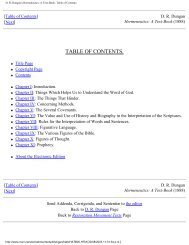Dungan - Hermeneutics
Create successful ePaper yourself
Turn your PDF publications into a flip-book with our unique Google optimized e-Paper software.
D. R. <strong>Dungan</strong>'s <strong>Hermeneutics</strong>: A Text-Book: Chapter IV.<br />
(1.) This originated in heathenism.--Because of its origin it is called "mythical." It was maintained<br />
that no man could interpret the communications from the deities unless be was en rapport with said<br />
divinities. This gave [58] position and prominence to those men of holy calling. The church adopted as<br />
much of heathenism as was thought best to render Christianity popular with the people; hence the same,<br />
or similar claims, had to be, made for her priests. This was not done all at once but came, like other thing,<br />
which have no authority in, the New Testament, little at a time, until the whole distance was overcome.<br />
(2.) The several reformations that have taken place have removed somewhat this veneration for the<br />
priesthood, but have not entirely removed the mistake; for while we have ceased to regard ourselves as<br />
the subjects of priest-craft, we continue a superstition quite akin to it. A common error remaining is that<br />
God's book is to be miraculously interpreted--that no one is competent to understand these things unless<br />
he has been called and divinely qualified for the task. This about as effectually removes the Bible from<br />
the masses, as the old theory of its interpretation belonging only to the priesthood. It leaves us dependent<br />
upon those highly fortunate ones who have been thus especially endowed for the work. They may be<br />
priests, or not. But in either case they must have been called of God to this work. If this theory were true,<br />
the Bible would be of no value whatever. The inspiration in these interpreters would be sufficient,<br />
without any Bible. Hence the effect of this theory has been to prevent the people from looking to the<br />
Bible for instruction. Regarding themselves as dependent upon inspiration, they have waited for it to<br />
accomplish its work, and break to them the will of God.<br />
(3.) The evil results of this theory might be called legion, for they are many. All kinds of ambitious<br />
pretenders have found security under such claims. If we [59] deny their rights to such espionage over the<br />
great family of God, they are able to beat us back, by their assumptions that it had been given to them<br />
only to understand their prerogatives. Sects and parties have grown from this seed in great abundance.<br />
Men who have wanted a following, have been thus enabled to lead away multitudes of disciples after<br />
them. As these leaders have differed as to the things of God, many of their followers have been led into<br />
doubt and skepticism. If these inspired men can not agree concerning the things which their God wishes<br />
them to do, the common people can not be expected to know anything about it. They know, too, that<br />
where there is contradiction there is falsehood, for it is not possible that truth should disagree with itself.<br />
(4.) If the Bible does not mean what it says, there is no way by which we can know what it does<br />
mean. Indeed, if it is a revelation at all, then it must signify just what such words would mean if found in<br />
another book. If they have any other meaning than that in which they would be understood by the people<br />
to whom they were employed, then they were absolutely misleading. In that case the Bible is not only not<br />
a revelation, but a false light, doing a vast amount of injury by leading simple-hearted people into the<br />
wrong way.<br />
SEC. 29. THE ALLEGORICAL METHOD.<br />
Definition.--This method treats the word of God as if it had only been intended to be a kind of<br />
combination of metaphors--a splendid riddle. Interpreting by this method is not exegesis but eisegesis--<br />
http://www.mun.ca/rels/restmov/texts/ddungan/hatb/HATB04.HTM (7 of 29) [30/08/2003 11:33:02 p.m.]




